

It is time for a nice and easy day trip and Becky joins me to visit Phnum Baset (Phnom Baset) which is located just about 30 km north of Phnom Penh. We also want to visit Longvaek, which is located 20 km further north and used to be the capital of Cambodia before the court moved to Udong. The plan is then to cross the Tonle Sap with the Ferry close to Udong and ride back to Phnom Penh either on National Road 6 or – if we have still time and it does not rain – to cross the Mekong with the Ferry at Praek Anhchan and ride back on the secondary road along the eastern bank of the Mekong.
We leave Phnom Penh at around 10 am and head north on National Road 5. Phnum Baset is not mentioned in any of the guide books I use. Therefore, we rely on the map, according to which we have to leave the national road after about 15 km and follow a secondary road to the west. We keep riding and watch out for this road. We pass a number of roads and finally stop and ask people at the roadside for the way. After some talk, two young women offer to join us (in pyjamas on a Honda Chaly) and show us the way. We follow them for some kilometers until they turn left into a narrow road. They stop after we have passed a (really muddy) market and indicate that we have to follow this dirt road for a few kilometers to reach Phnum Baset.
This is what we do. A number of cars are traveling on the road, apparently mostly Cambodian visitors from Phnom Penh. After some time we reach a junction in between a number of hills and follow the road to the right, ride up the hill where we park the bikes. We walk up to the modern pagoda on the hill top. This pagoda is surrounded by a number of religious buildings and monuments and there is a nice view in almost all directions.
This is the pagoda.

Over there is Phnom Udong.

We pass a huge lying Buddha.
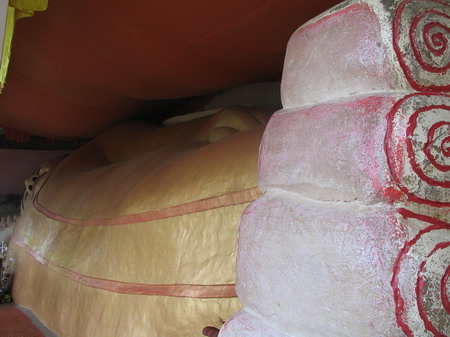
Over there is Phnom Penh. It is not far and I can recognize a number of buildings.

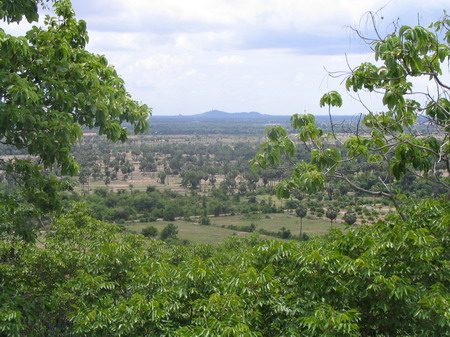

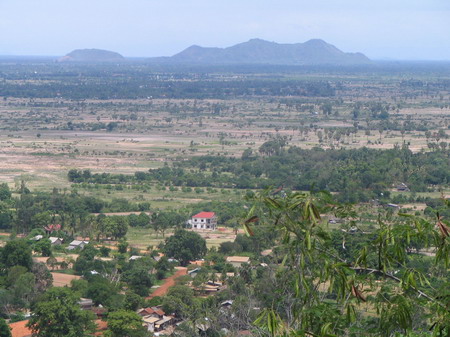
There is a rather small ancient temple in the vicinity.
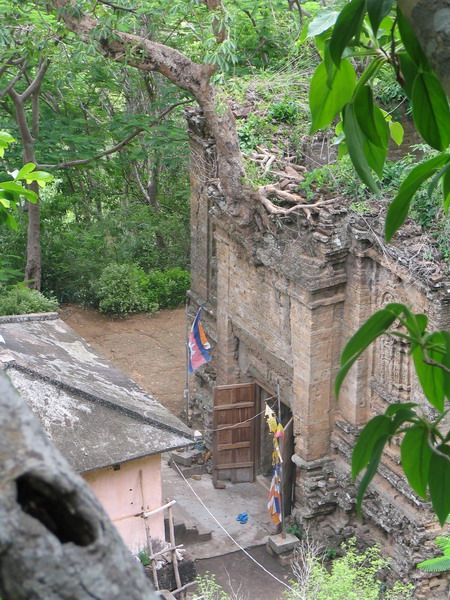
The temple is made of bricks, suggesting that it was build prior to the Angkor period.

A tree is growing out of the building, right above the gate.
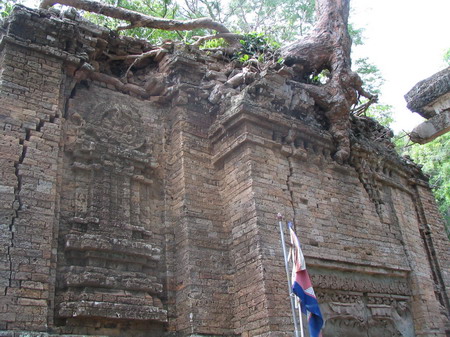
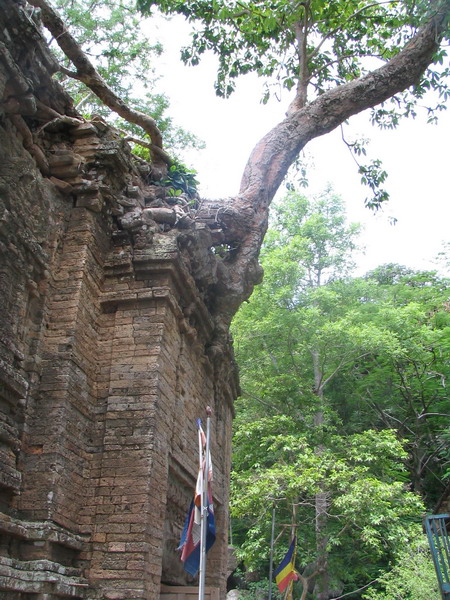
One of the walls of the temple is destroyed entirely. It looks like a huge rock broke off the hill further up and smashed into the temple.

After some time we walk back to the motos and ride down the hill. From here we follow the dirtroad further west, towards Road 51, which goes north parallel to National Road 5 and joins it in Udong. The dirt road is in very good condition and makes for a nice ride.

We reach Road 51 at its intersection with the railway track.
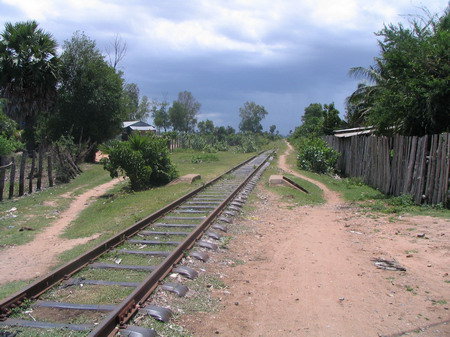
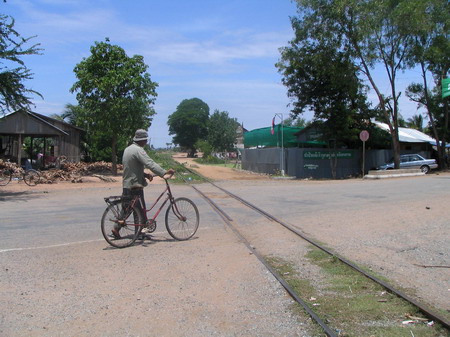
The road is very wide and in very good condition. Actually it is in better condition than the national road. And there is not much traffic.
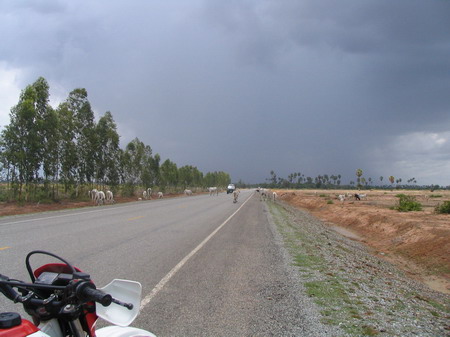

Over there is Udong Mountain.

The sky is clouded and increasingly it looks like it will start raining soon. We keep riding until we reach the national road and head further north towards Longveak. After a few kilometers it starts raining and we decide to ride back to Udong and have lunch, hoping that it does not rain anymore by the time we finish.
So we have lunch in a Khmer restaurant, after which we head towards Longveak again. We turn right and follow a narrow road which according to the map leads to Longveak.
Longveak is not mentioned in any of the guide books I use and people told me that there is nothing left to see after everything was destroyed during I am not sure which of the countless wars. About Longveak, Mabbett and Chandler write in their book “The Khmers”:
“By the mid-sixteenth century, however, the royal and ceremonial capital of Cambodia had shifted some fifty miles north of Phnom Penh, near present –day Longvaek, and the kingdom had earned a reputation among foreigners for its great wealth … In the mid-sixteenth century, a Cambodian king from Longvaek, in the course of a hunting expedition in the north-west, stumbled across the abandoned temples of Angkor … and decided to transfer his court to Angkor … his stay among the temples was brief … a Thai army besieged Longvaek unsuccessfully in 1587. Foreshadowing the conduct of nineteenth- and twentieth-century Cambodian leaders, the Cambodian king sought help from a distant country – the Spanish Philippines – even promising to become a Catholic if sufficient military help arrived. It never did; instead, the Thai returned in 1594 and sacked the capital … the capture of Longvaek opened up a period of Thai suzerainty over the Cambodian court that lasted, with some short interruptions, until the arrival of the French in the 1860s.”
The authors go on quoting and interpreting two Cambodian myths associated with Longvaek. This is worth reading but to long to repeat here. However, given that this place was the capital of Cambodia when the country was wealthy and ruled autonomously seems to give it enough historic significance to visit.
We follow the road for some kilometers until we reach a modern temple. We do not see anything that would indicate the significance of the place. As it looks like it will start raining again, we turn around and ride back towards Udong. It does start raining after only few minutes and it rains strongly by the time we pass Udong. We follow the road for some kilometers until we reach the ferry. By this time we arrive we are soaking wet.
Waiting for the ferry. I just bought the bike to the left some days ago and this is the first trip I do with it.

This is the Tonle Bassac. The ferry is about to leave the other bank.


People waiting to get on the ferry.

Many vehicles and people are on board already, many of them watching us while we are riding the bikes onto the ferry. I go first. When I am about to park the bike on the ferry, I hear all the people in front of me making a long “Uuuuuuhhhhhh”, followed by the sound of something heavy falling into the water. I turn around and see that this is indeed what just happened to Becky and her bike.

I learn later that the back wheel of Becky’s motorbike got stuck, which caused the bike to stop suddenly and her to fly over the handlebar straight into the river, followed by the moto. She definitely chose the best point in time during our trip to maximize the number of people watching this entertaining stunt.
With the assistance of some friendly Cambodian men, Becky manages quickly to lift up the bike and get it onto the ferry. However, it does not start. Some Cambodians around her express the opinion that women just lack the skills to ride motorbikes, which Becky manages to answer with a smile.
It is still raining strongly when we reach the other bank and by the time we arrive I am almost as wet as Becky is. We get off the ferry and try hard to start the bike. After some time it does start. However, any attempt to speed up beyond 40 km per hour causes the engine to fail and only produce some funny noise that suggests that water is involved. For now we have no other choice but keep going at low speed, hoping that the bike will get back to normal while we go along. We keep going until we reach National Road 6. The performance of the bike does not improve. We stop at the shop of a local mechanic and people try for some time to fix the bike. However, they fail and we decide to rid to Phnom Penh at low speed. Riding the bike with just about 40 km turns out to be more difficult than expected, as significant traffic on both sides of the road make overtaking other vehicles a risky and time consuming affair. It takes a long time until we reach Phnom Penh and I am glad to arrive at home, cold and wet.